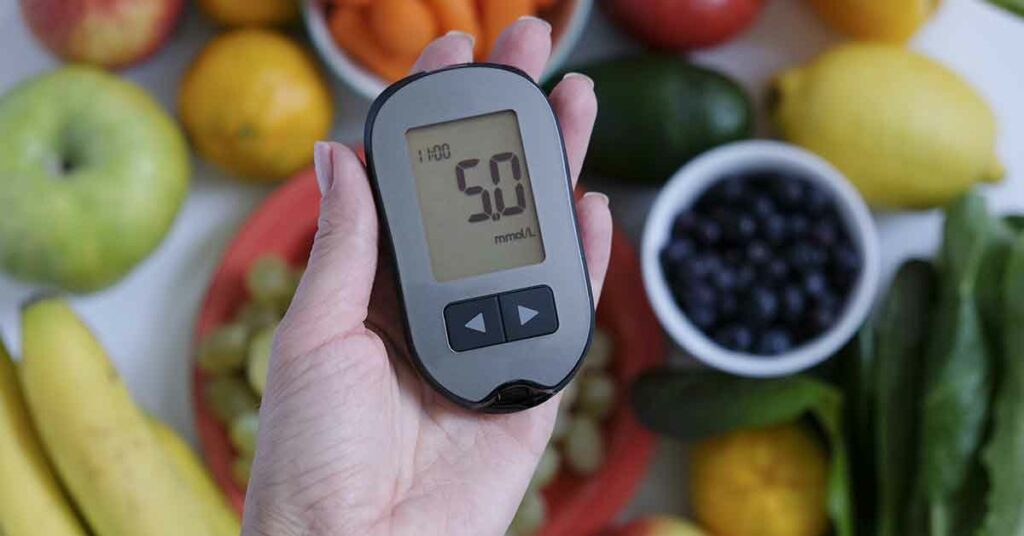
Diabetes is a common chronic medical condition that affects how your body turns food into energy. It occurs when there is an excess of glucose (sugar) in your body.
People diagnosed with diabetes either don’t produce enough insulin or the insulin they produce does not get optimally used as required by the body. In both conditions, there is excessive sugar getting stored in the bloodstream which eventually causes serious related health problems. Sadly, diabetes is increasing at an alarming rate in the United States. According to the latest CDC reports:
- Over 30.3 million US adults have diabetes but 1 in 4 of them don’t know they have it
- Diabetes is the 7th leading cause of death
- Diabetes is the #1 cause of kidney failure, lower-limb amputations & adult blindness
- Over 1.4 million new cases of diabetes are diagnosed every year
- In the last 20 years, the number of adults diagnosed with diabetes has doubled
(CDC 2019)
What are the different types of diabetes?
Chronic diabetes conditions include Type 1 and Type 2 diabetes. We will explain in detail about these conditions and the warning signs related to them. Apart from Type 1 and 2, there are two potentially reversible diabetes conditions, prediabetes, and gestational diabetes.
What is Type 1 Diabetes?
About 10% of people have Type 1 diabetes or insulin-dependent diabetes. Type 1 diabetes has also been called juvenile diabetes because it usually develops in children and teenagers.
In this case, the body’s immune system attacks the insulin-producing islet cells in the pancreas. This attack on the body’s own cells is known as an autoimmune disease. But once the insulin-producing cells are destroyed, a person can no longer produce their own insulin.
As a result, the body’s cells starve. And, if left untreated, high blood sugar levels can damage eyes, kidneys, nerves, and the heart, and can also lead to coma and death.
What are the Warning Signs?
The onset of type 1 diabetes happens very quickly. The following symptoms may appear suddenly and shouldn’t be ignored::
- Increased thirst
- Increased urination (bed-wetting may occur in children who have already been toilet trained)
- Rapid and unexplained weight loss
- Extreme hunger
- Extreme weakness or fatigue
- Unusual irritability
- Blurred vision
- Nausea, vomiting and abdominal pain
- Unpleasant breath odor
- Itchy skin
(CDC 2019)
What is Type 2 Diabetes?
The most common form of diabetes is called type 2 diabetes, or non-insulin dependent diabetes. It is also called adult-onset diabetes since it typically develops after age 35. People with type 2 diabetes are able to produce some of their own insulin which often does not suffice. This is called insulin resistance.
What are the Warning Signs?
The symptoms of type 2 diabetes are similar to those of type 1 diabetes. But the onset of type 2 diabetes is usually a bit slower and the symptoms may not be as noticeable as those for type 1 diabetes. For these reasons, many people mistakenly overlook these warning signs.
Prediabetes
Prediabetes occurs when blood sugar levels are higher than usual but not elevated enough to be classified as diabetes. If ignored, it raises your risk of type 2 diabetes, heart disease & stroke, etc. But the good part is that a healthy lifestyle change can reverse this condition.
Gestational diabetes
Gestational diabetes occurs during pregnancy but often resolves after delivery. Expecting mothers can discuss risks for pregnancy complications with their doctors and decide on a plan to monitor blood sugar and manage diet to minimize adverse effects to the baby.
(Weatherspoon 2019)
There isn’t a definitive cure for diabetes at this time, but shedding extra weight, eating a balanced diet and maintaining an active healthy life can keep it under control. Taking medicine as needed, getting diabetes self-management education and support, and keeping health care appointments can also reduce the impact of diabetes on your life.
When Diabetes Warrants an ER Visit
If you have Type 1 diabetes and experience symptoms of heart attack, stroke, or have trouble breathing, consider it a health emergency and get to the ER. It’s important to know warning signs. You are your biggest health advocate. The American Diabetes Association has a wealth of knowledge that can get you started and keep you on track to living a long and healthy life with the disease.
Our Board Certified ER Physicians are trained to treat diabetic emergencies. We are here for you 24/7, 365 days of the year with immediate admission.
Works Cited
“Learn about Diabetes.” Centers for Disease Control and Prevention, Centers for Disease Control and Prevention, 6 Aug. 2019, www.cdc.gov/diabetes/basics/diabetes.html.
“Diabetes Overview.” Diabetes Overview – Symptoms, Causes, Treatment,
www.diabetes.org/diabetes.
Dansinger, Michael. “Early Signs and Symptoms of Diabetes: How To Tell If You Have It.” WebMD, WebMD, 12 June 2019, www.webmd.com/diabetes/guide/understanding-diabetes-symptoms#1.
Weatherspoon, Deborah. “Do I Have Diabetes? Know the Warning Signs.”
Https://Www.healthline.com/, 19 June 2019, www.healthline.com/health/diabetes/diabetes-warning-signs.





